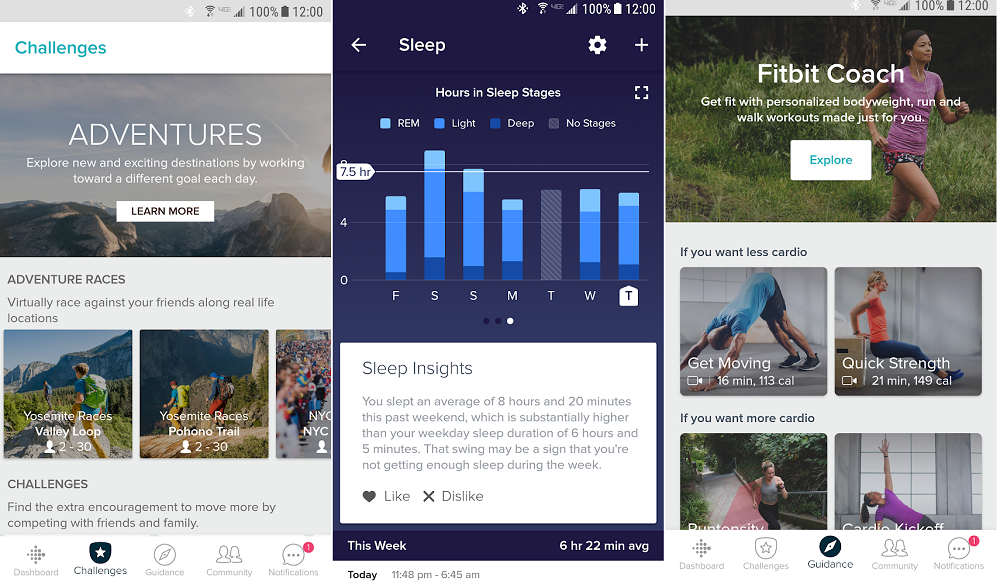
Staying fit and healthy is the most sought after lifestyles in today’s world. For some people, it is just a matter of following a trend while for others, prevention of major health issues is the ultimate concern. With people resorting to healthy lifestyles day by day, the demand for fitness-related or health-related devices has tremendously increased in the market. And so has the demand for fitness activity tracker applications.
Fitness activity tracking applications facilitate easy maintenance of a healthy life. They perform various functions such as tracking physical activities, calorie intakes, calculating psychological signals and so on. They also help in setting different fitness goals and sharing innovative work out ideas, thus making workout exciting and easy. But one should know which fitness app to use depending on the type and amount of physical activity one aims to indulge in.
There are a plethora of fitness applications available across various platforms. But in order to serve the real purpose, they should be built using the appropriate tools and hardware. This article is generic guidance for the stakeholders and for everyone who wants to develop the app health monitoring app.
The choice of language is up to the developer, but there are popular and powerful APIs which you can leverage. Let us have a look at the different technologies or APIs that can be used for building a successful Fitness App:
List of APIs and tools required for building Fitness tracker apps:
Jawbone UP
Jawbone UP is a tool, which can measure the number of steps taken by an individual. They have their own mobile application but it is an open source tool. Hence, it allows access to their SDK and API to third parties for building their fitness apps.

Fitbit
Apart from being a tool, Fitbit is also a manufacturer of fitness devices. Moreover, the Fitbit mobile application allows users in integrating this app with their smartwatches or bracelets of different brands.

Strava
This tool helps in tracking fitness activities through mobile devices. They have their own application and website, which can be used to build quality fitness applications. Moreover, they allow free access to their database to use their workouts for building fitness apps. It is one of the most reliable API tools

Withings
This is a very well known API for fitness applications. Its design and innovative features are top class. One can access this API tool simply by registering as a Withings developer.

Garmin
This tool helps you in devising fitness tracking apps for interacting with Garmin fitness devices.

Lumo
Lumo is a manufacturer of fitness gadgets. Lumo fit and Lumo back are two popular devices, which help one in controlling and adjusting one’s posture. Apart from being gadget makers, they have their application too. These apps integrate with Lumo devices. Other devices can be used in synchronization with the Lumo apps too.

Exist
This app helps in tracking weight, fitness, sleep time, computer usage, and many more lifestyle habits. It is an open source tool.

FoodSpex
As the name itself suggests, FoodSpex provides you with detailed information regarding the nutritional contents such as calories, bar code, fat, etc of different food products.

What hardware is required to build a good fitness tracker app?
Choosing the right API tool is just one step towards building a successful fitness app. Your fitness app will fail to serve its purpose if the right hardware is not used for building the same.
Here is a list of a few hardware, which are used in building fitness applications:
GPS: We all know what purpose GSP serves. It helps in tracking the location of an object and also helps in navigation. This is a must use in fitness app relating to running, hiking, cycling, etc. If your fitness app is lacking this service, then it is a major drawback.
Bioimpedance sensors: This sensor helps in collecting heart rate, respiration rate. It does so by measuring the resistance of body tissues to electric current.
BMI calculator: As simple as it sounds, the BMI calculator helps users in calculating their Body Mass index (BMI). With this service, you can make sure if your BMI is ideal for your height and weight.
Accelerometer: As the name itself suggests, the accelerometer measures the acceleration. It collects data like speed, cadence, calories, distance while the user is cycling, walking, swimming or indulging any other physical activities.
Barometric altimeter: This hardware is more complex physical activities such as rock climbing, trekking, etc. It tracks the altitude of the user by measuring the atmospheric pressure.
Gyroscopes: This application is generally used with the accelerometer. Gyro calculates the changes in the angles of the orientation of an object. This hardware can also be used separately.
Chest strap: Chest strap makes use of ECG sensors for calculating an individual’s heart rate and pulse rates. They make use of LED beams.
Skin response sensors: This sensor measures the change in body temperature due to the performance of any physical activity. It calculates the heart rate as well. It also helps in keeping track of the stress level of the individual.
Ambient light sensors: This is a handy sensor. This sensor detects the amount of light prevailing in the environment in which the user is performing physical activities. In a low light environment, it automatically increases the brightness of the display screen to facilitate easy and uninterrupted operation.
Conclusion: In a nutshell, we can say that fitness activity tracking apps are a combination of the perfect API tool and hardware. Both play an equal role in delivering the essential features in the application. We, Matellio, are a team of expert Web & Mobile App Development Company based in the USA. Our talented group of Developers can help you in building the most reliable and potential fitness activity tracking applications for your business and other custom needs. We provide superior fitness app development services keeping in mind the diverse needs and requirements of our clients. We have a good track record of building top-class fitness applications for a large number of clients for various platforms like IOS, windows, android, Linux. Get in touch with us, and we are just a call away.



